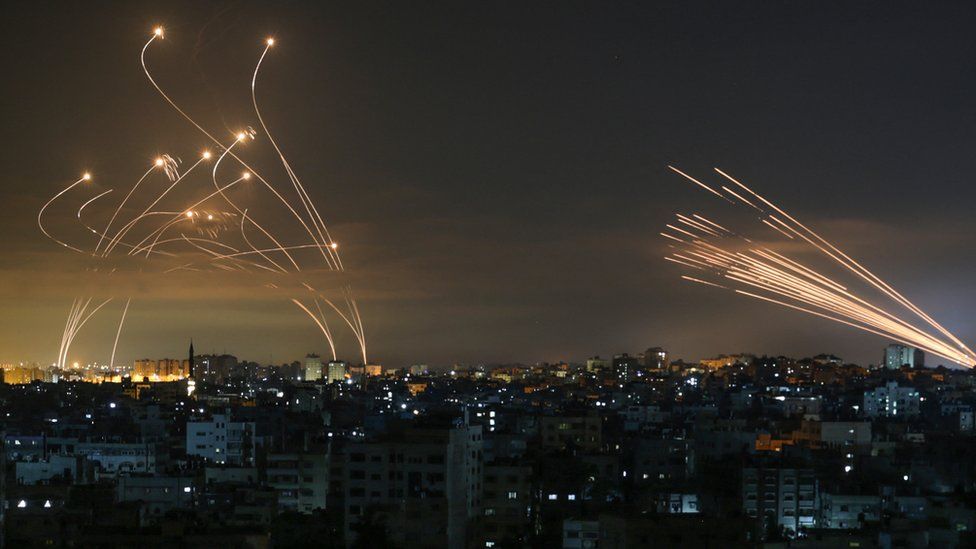Iran on Tuesday night unleashed a barrage of missiles at Israel. Launching over a hundred ballistic projectiles at the Jewish majority nation, forcing over 10 million people to take refuge in bomb shelters as the missiles and interceptors exploded in the skies.
In a move that could signal the beginning of a long drawn out confrontation, Iran has once again launched an attack against Israel. Earlier in April this year, Iran had launched a massive attack against Israel involving more than 300 drones, ballistic missiles and cruise missiles, most of which were downed by Israel’s air-defense system.
Most of the clashes between Israel and Iran have been conducted between proxies on foreign lands, as Israel continues to clash with Hezbollah and Hamas. But now once again Iran has directly attacked Israel and escalated the already tumultuous situation in the region.
The attack by Iran
Iran’s Islamic Revolutionary Guard Corps (IRGC) said that its forces have used hypersonic missiles for the first time. It also claimed that 90 per cent of its projectiles hit targets, including three military bases in the attack.
Meanwhile an Israeli security official said that in cooperation with the United States, the Israeli Air Force had managed to intercept many of the missiles, though there were some direct hits damaging buildings and igniting fires. A significant number of the missiles fell near the headquarters of Mossad in Tel Aviv, Nevatim Air Base and Tel Nof Air Base. An Iranian missile hit close to a school in central Israel and a restaurant in Tel Aviv.
Iran declared that the missiles were in response to the assassinations of Hezbollah leader Hassan Nasrallah and Revolutionary Guard’s General Abbas Nilforushan. It also mentioned Ismail Haniyeh, a top leader in Hamas who was taken out in Tehran in a suspected Israeli attack in July. Tehran warned that this attack represented only a first wave.
Iranian president Masoud Pezeshkian wrote in a post on X, “Based on legitimate rights and with the aim of peace and security for Iran and the region, a decisive response was given to the aggression of the Zionist regime. This action was in defence of the interests and the citizens of Iran. Let Netanyahu know that Iran is not a belligerent, but it stands firmly against any threat. This is only a corner of our power. Do not enter into a conflict with Iran.”
Israel’s response
Israel’s skies were lit up by the defensive interceptors of the sophisticated Iron Dome system. The Iron Dome is Israel’s first line of defence against armed projectiles. Apart from the system the US and the UK also steeped in to help out in the country’s defence. According to the Pentagon, USA fired about a dozen interceptors at the barrage of Iranian ballistic missiles. UK forces were also involved in supporting Israel. Defence Secretary John Healey said British forces had “played their part in attempts to prevent further escalation.”
In a stern warning to Iran, Israeli Prime Minister Benjamin Netanyahu said that the latter committed a “big mistake” by attacking Tel Aviv and vowed to retaliate against Iran. “Iran made a big mistake tonight and will pay for it, whoever attacks us, we will attack them,” the PM said hours after missiles were launched towards the Jewish nation.
Speaking at a Cabinet meeting of Israeli ministers, Netanyahu said that Iran does not understand Israel’s determination to retaliate against its enemies. “They will understand. We will stand by the rule we established: whoever attacks us – we will attack them,” he said reiterating his words at the United Nations just a few days back.
Support from Allies
US President Joe Biden said the US “actively” supported Israel’s defence at his direction. He said he had spent the morning in the Situation Room, the White House hub, for handling serious national security issues. US Defence Secretary Lloyd Austin said, “We condemn this outrageous act of aggression by Iran, and we call on Iran to halt any further attacks, including from its proxy terrorist groups”.
British PM Keir Starmer in a statement from Downing Street on Tuesday evening, said that Tehran has “menaced the Middle East for far too long” and called on the country to “stop these attacks”. French President Emmanuel Macron also joined in the rally, condemning Iran’s attacks on Israel, adding that, in a sign of its commitment to Israel’s security it has mobilised its military resources in the Middle East on Wednesday. Japan’s new Prime Minister Shigeru Ishiba and Australian PM Anthony Albanese also declared their support for Israel while condemning Iran.
Only on Tuesday morning, Israel had announced that it will begin its ground operations in Lebanon targeting Hezbollah. This attack from Iran comes just days after the killing of Hezbollah leader Hassan Nasrallah and the pager, walkie-talkie attacks. Now it seems the theatre of war will widen, with a hard response from Israel imminent. The Israeli military will now ready itself to take on Iran while it simultaneously remains in confrontation with the Hezbollah in Lebanon, the Houthis in Yemen, and the radical outfit Hamas.
